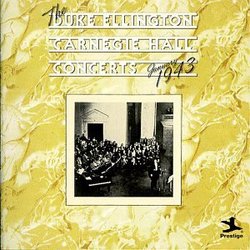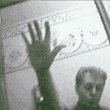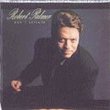| All Artists: Duke Ellington Title: Carnegie Hall Concerts, January 1943 Members Wishing: 0 Total Copies: 0 Label: Prestige Original Release Date: 1/1/1943 Re-Release Date: 7/1/1991 Album Type: Live Genres: Jazz, Pop Styles: Swing Jazz, Traditional Jazz & Ragtime, Orchestral Jazz Number of Discs: 2 SwapaCD Credits: 2 UPCs: 025218540421, 0090204703654, 090204703654, 025218540421 |
Search - Duke Ellington :: Carnegie Hall Concerts, January 1943
 | Duke Ellington Carnegie Hall Concerts, January 1943 Genres: Jazz, Pop Though the audio quality of this, the first of Ellington's annual Carnegie Hall concert presentations, is not the greatest, the music is utterly extraordinary. Beginning, appropriately enough for a wartime concert, with "T... more » |
Larger Image |
CD DetailsSynopsis
Amazon.com essential recording Though the audio quality of this, the first of Ellington's annual Carnegie Hall concert presentations, is not the greatest, the music is utterly extraordinary. Beginning, appropriately enough for a wartime concert, with "The Star Spangled Banner" and moving through a cavalcade of the band's greatest arrangements and solo features (including an uncommonly brisk, virtuoso turn for Ben Webster and company on "Cotton Tail"), The Duke Ellington Carnegie Hall Concerts: January 1943 is a stunning portrait of America's greatest orchestra at the peak of its powers. As was his wont, the Duke used these concerts as a springboard for the premiere of an extended work, and what really makes this an essential item for fans and collectors is the only complete recorded document of Ellington's "Black, Brown and Beige" (Duke later recorded a very moving but incomplete version featuring Mahalia Jackson for Columbia). A sweeping, ambitious long form, "Black, Brown and Beige" traces the history of African Americans from slavery days onward, alternating between the celebratory and the reflective. It features some of Duke's most inspired writing and one magnificent solo spot after another, but none so grand as Johnny Hodges's stunning testimonial on "Come Sunday." --Chip Stern Similarly Requested CDs
|
CD ReviewsI agree -- essential. Steve Schwartz | New Orleans, LA USA | 07/28/2005 (5 out of 5 stars) "Ellington's large works have usually been slammed by classical music critics, who apparently expected him to produce Beethovenian sonata-allegros. Furthermore, they had very little idea of the popular models Ellington took off from. "Black, Brown, and Beige" in particular suffered from this kind of ignorant dismissal. Ellington's dearest ambition was to be taken seriously as a composer, in the sense that Bartok and Stravinsky were, rather than as a "mere" bandleader and songwriter, and these criticisms made him insecure and extremely defensive. After his critical mauling, Ellington withdrew "Black, Brown, and Beige" for a time and jettisoned at least two movements. When BB&B returned, it had been substantially rethought. Fortunately, all the original had been recorded (although not all of it at the Carnegie Hall concert), and that's what this CD gives us here. This is a highpoint of Ellington, which means a highpoint of American music (popular or classical), and for that reason alone, this CD justifies its existence. In addition, you get the Ellington band of the Forties in performances of classics like "Ko-ko," "Rockin' in Rhythm," the portraits of Bert Williams, Florence Mills, and Bojangles, "Cotton Tail," "Black and Tan Fantasy," "Boy Meets Horn," and many more Ellington standards, as well as "Rose of the Rio Grande," to remind you that the band wasn't in it just for the art. The sound isn't the best, even for recordings of the period, but that consideration is absolutely irrelevant for people who actually listen to music, rather than to engineering." Music and history bukhtan | Chicago, Illinois, USA | 11/02/2002 (5 out of 5 stars) "This was the first of Duke's Carnegie Hall concerts (Benny Goodman got his chance not later than 1938!). It turned out to be quite a trauma for Duke, since the suite "Black, Brown and Beige" was not well received by the critics. This recording, by the way, is actually a composite of recordings (because of technical problems or damage suffered by materials in storage?) made here and in Symphony Hall in Boston a few days later, apparently before all the negative punditry got to Duke. This is the only complete "BB & B", and, to my ears, much more convincing than various truncations later on. The rest of the performances are less important historically but very enjoyable for Ellington fans or anyone who cares about jazz music. There is a beautiful trumpet solo on "Black & Tan Fantasy", variously attributed to Ray Nance or Wallace Jones, which in any event recalls Bubber Miley's melodic gifts as much as his growl. "Dirge" is not to my knowledge available elsewhere and is built around a fine Lawrence Brown trombone solo. Solos of similar quality occur throught the recording though I must say I miss Jimmy Blanton and Barney Bigard. Doesn't quite equal the miracle in the Crystal Ballroom at Fargo but still a great event." Including some of the greatest music of the 20th century JEAN-MARIE JUIF | BESANCON France | 02/28/2002 (5 out of 5 stars) "This set is extraordinary.Of course,the sound quality is not hi-fi,but it's very acceptable for a live recording of the war days.But more than this,like Duke's magnificent live recording in Fargo,1940,this concert includes some of the greatest music ever played.First, a look on the players: Rex Stewart,Shorty Baker,Wallace Jones,Ray Nance,trumpets;Lawrence Brown,Juan Tizol,Tricky Sam Nanton,trombone;Johnny Hodges,Harry Carney,Ben Webster,Otto Hardwicke,Chauncey Haughton,saxes;Fred Guy,guitar;Junior Raglin,bass;Sonny Greer,drums;Betty Roché,vocals;and of course,Duke on piano.The highlights ? All the tunes! But mostly,and incredible,more than six minutes long version of the old "Black and tan fantasy",with superlative playing by Hodges (did he ever played something that wasn't superlative?),great,very great growl and muted trombone by Sam Nanton (1904-1946),maybe the greatest master on this very difficult instrument;listen to his almost human voice when he plays trombone;this is truly overwhelming.Nobody never played trombone that way."Moon mist",a Billy Strayhorn (1919-1967) original,is a perfect vehicle for the violin of Ray Nance (1913-1976)."Jumping punkins" features Sonny Greer,Duke's greater drummer with Sam Woodyard (1925-1988).Then,the portraits: "Portrait of Bert Williams",featuring Sam Nanton in another extraordinary wah-wah intervention;"Portrait of Bojangles",one of the immense masterpieces from 1940,with a furious tenor sax solo by Ben Webster(1909-1973),maybe one of the greatest things ever blown;"Portrait of Florence Mills",aka "Black beauty",features the underrated Shorty Baker.Then comes THE masterpiece,the tune that will urge you to buy the set: "Koko",another 1940 gem.Don't miss it,this is one of a handful of masterpieces in the history of jazz.Nanton is sublime,and the arrangement is completly out of this world.Two minutes and twenty seconds of pure madness.I really wonder who many hours it took them to rehearse this amazing,short piece of music."Stomp",or "Johnny come lately",is a very difficult composition by Strayhorn,with great band playing."Black,brown and beige",an almost 50 minutes long suite,is a masterpiece which was very rarely played by Duke's band.It features,among others,some unreal playing by Sam Nanton.Then,another gem from 1940,"Jack the bear" and "Cotton tail",played at an incredible tempo by Ben Webster.The relaxed an melancholic "Day dream",in which Johnny Hodges swings one of the greatest things ever played on alto sax;"Boy meets horn",featuring Rex Stewart (1907-1967),another underrated master.And finally,"Mood indigo",one of the most beautiful tunes ever composed.Please,don't miss this very important concert,because it includes some of the greatest things ever played.Just forget the sound quality (which is not so bad),and let Duke's band seduce you ."
|



